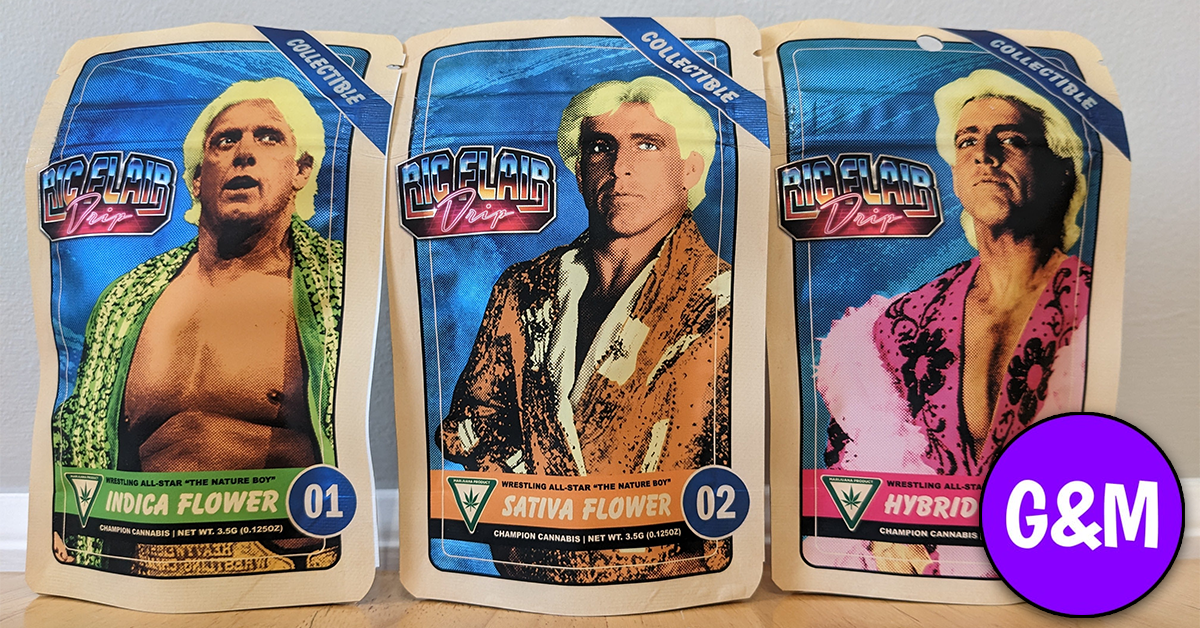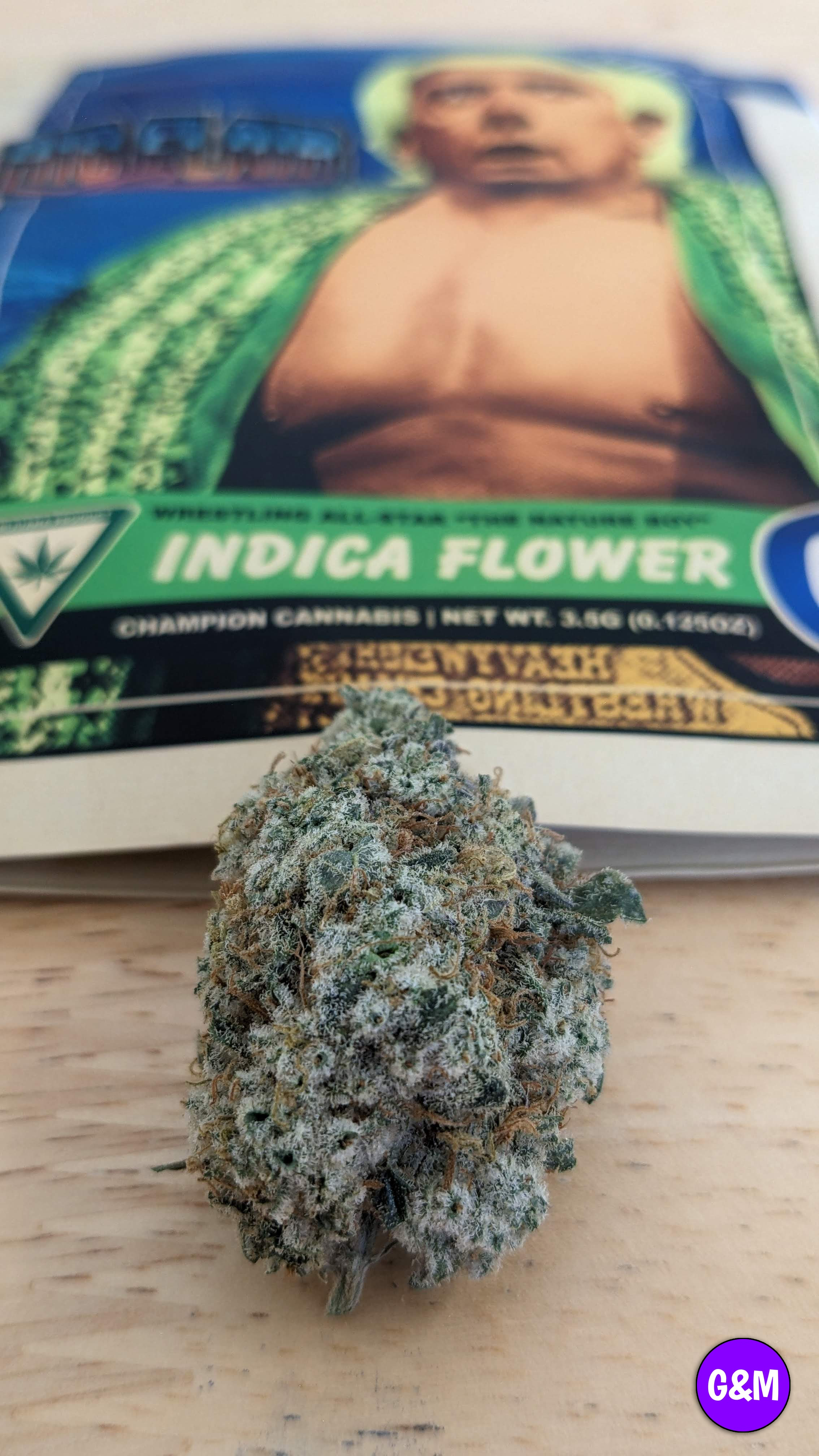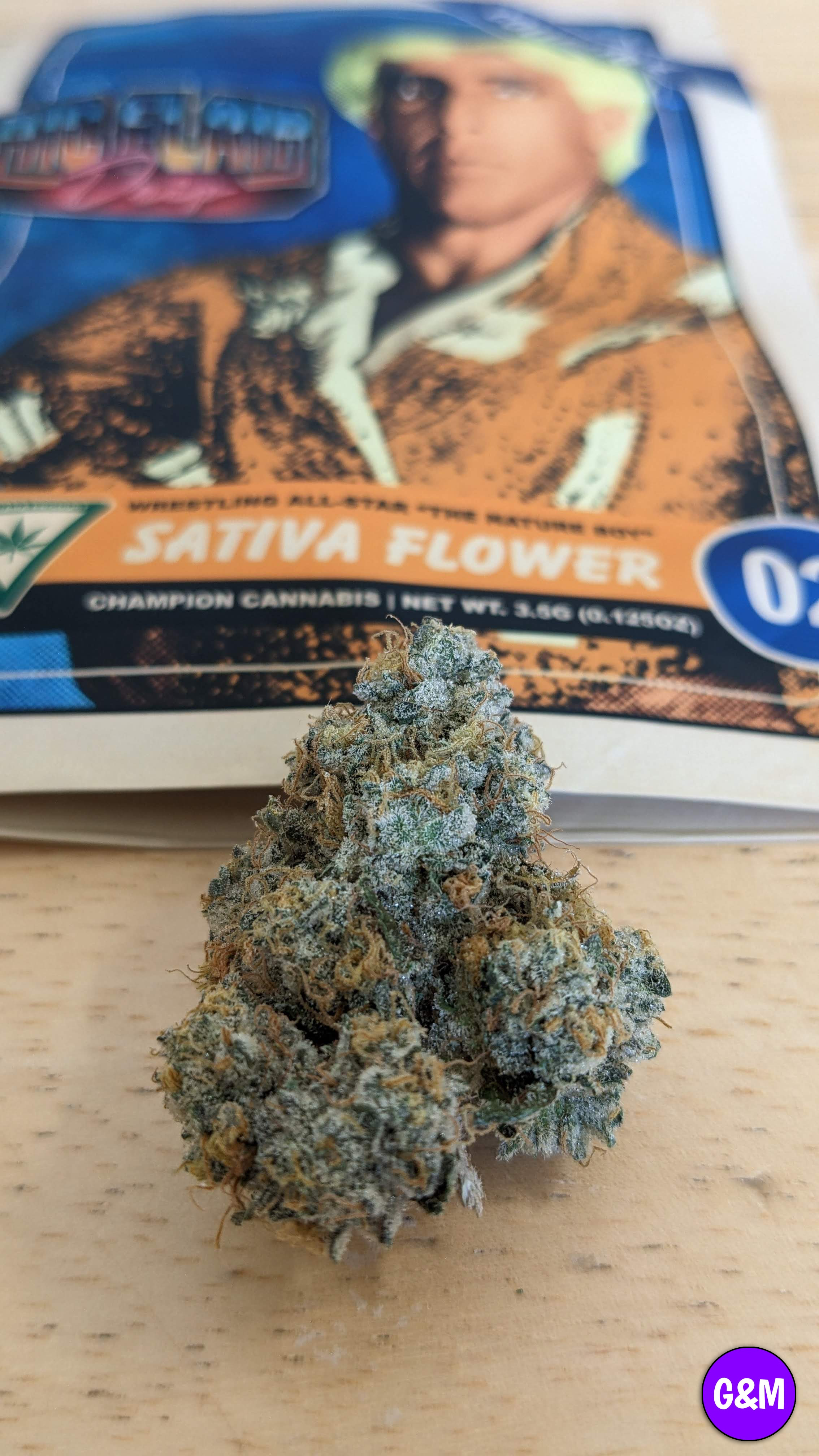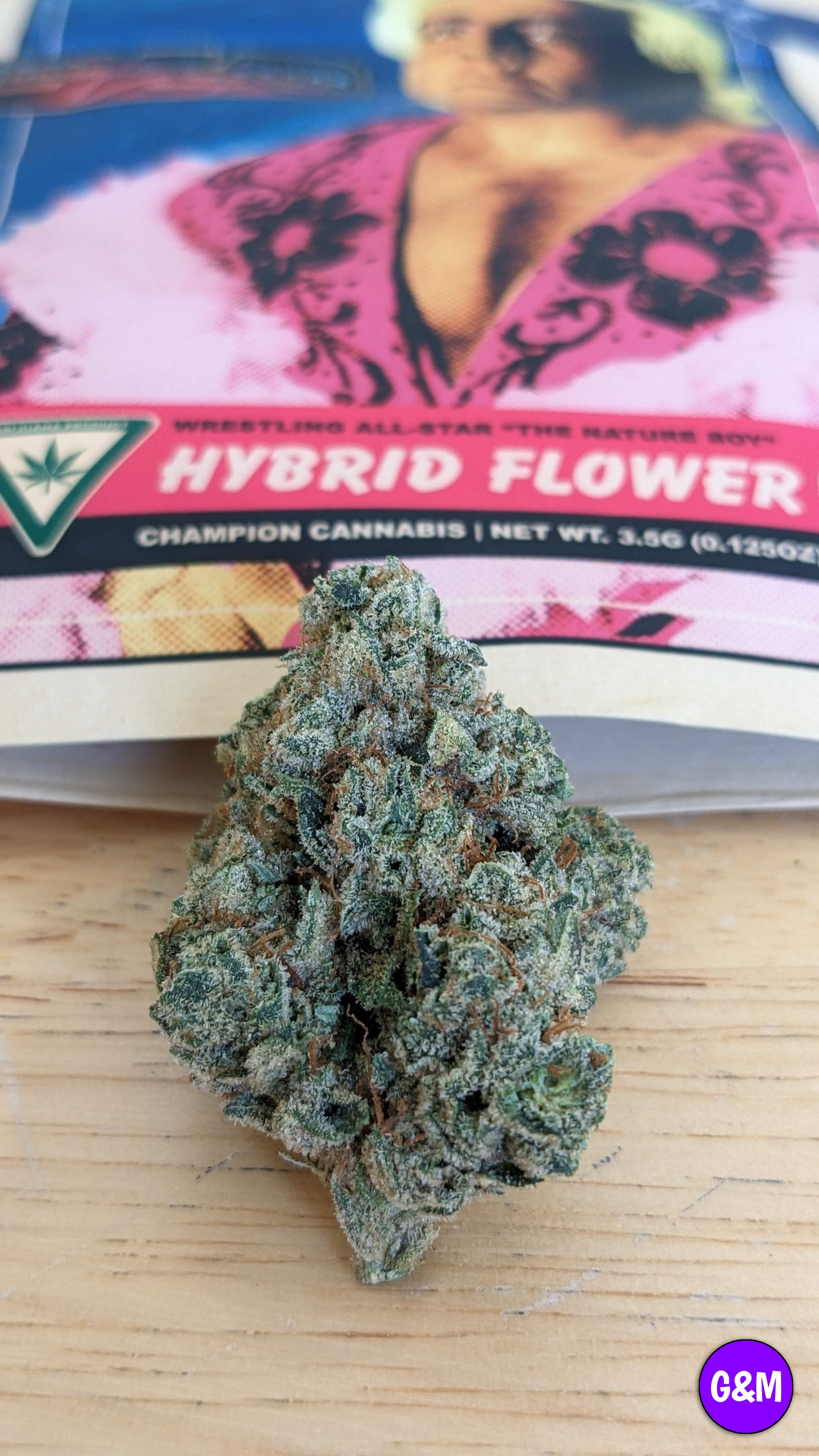Wrestling with Flavor: A Review of Ric Flair Drip Cannabis Line

Gas & Middies took on a triple review featuring the cannabis line inspired by the iconic wrestler Ric Flair, known for his larger-than-life persona and his "Woooooo!" catchphrase. The line, aptly named Ric Flair Drip, marks his foray into the Michigan cannabis market. The products are cultivated by Mitten Distro, a notable name in Michigan's cannabis scene, boasting a wide distribution network and a range of products.
Each product comes in packaging inspired by 80s action figures, featuring retro images of Ric Flair.
Review Highlights
-
Rollex OG (Indica):
- THC: 26.1%, CBD: 0.07%
- Appearance: Dense, big nuggets with sparkling trichomes.
- Aroma: Classic OG with a sweet, earthy undertone.
- Flavor: Disappointingly harsh and burnt, leaving an unpleasant aftertaste.
- Overall: Visually appealing, but the flavor is a letdown.
- Rating: Middies 🥱
-
Trainwreck (Sativa):
- THC: 26.6%, CBD: 0.07%
- Appearance: Slightly less impressive than Rollex OG but breaks down well.
- Aroma: Sweet and earthy.
- Flavor: Initially fine, but deteriorates into a bad aftertaste.
- Overall: An improvement over Rollex OG, but still not up to the mark.
- Rating: Middies 🥱
-
Faceoff OG (Hybrid):
- THC: 25%, CBD: 0.07%
- Appearance: Average, with visible trichomes.
- Aroma: Earthy with a funky note.
- Flavor: Harsh and bitter, not enjoyable.
- Overall: Consistent with the other two in disappointing on taste.
- Rating: Middies 🥱



Final Thoughts
Despite the allure of Ric Flair's branding, all three strains from the Ric Flair Drip line share a common story: visually decent, acceptable aroma, but significantly lacking in flavor. The best of the trio, if one must choose, is the Trainwreck Sativa. However, none of these strains come recommended.
This review is a condensed version of the original, detailed review available on Gas & Middies. Your source for Michigan cannabis reviews & information. Finding the gas ⛽ through all of the middies 🥱
Munising Cannabis Co. to Shut Down Despite Local Popularity

The Munising Cannabis Company is slated to cease operations permanently by the end of this year, after just one year in business. Jody Irving, the General Manager of Munising Cannabis Co., highlighted the company's unique approach and the financial burdens it entailed.
Unlike traditional dispensaries, Munising Cannabis Co. operated as a microbusiness, which subjected it to different regulatory constraints affecting its sales and production processes. "Our entire operation was self-contained. We grew our cannabis, processed it, and created our edibles all in-house. While this approach was aligned with our vision, it proved to be financially unsustainable, involving high costs in growing, labor, and overall management," explained Irving.
As the company prepares to close, it is currently offering a 40% discount on all items, a promotion that is expected to increase in the coming weeks. Despite the impending closure, Irving expressed pride in the company's achievements, "We aimed to make Munising proud. Being the only microbusiness in the Upper Peninsula and receiving recognition as the number one in the state by Michigan Green State magazine were significant milestones for us. However, these accolades were not sufficient to keep our business viable."
The company's struggles were exacerbated by its late opening in October of the previous year, missing the crucial tourist season. This delay was attributed to state-level procedural setbacks. "Starting a business in the winter, especially in a tourist-dependent area, posed its own set of challenges," Irving remarked.
The closure of Munising Cannabis Co. will affect its six employees, who are now seeking employment elsewhere. The tentative closing date is set for December 27th, after which the building will be put up for sale or lease. The decision to shut down comes amidst stiff competition from two other marijuana dispensaries in the area and the high costs of maintaining its unique microbusiness model.
For Everyone Collective: Blending Fashion with Social Change in Grand Rapids

For Everyone Collective, a Grand Rapids-based custom screen printing company with a unique social mission, recently inaugurated its first physical retail store on the city's far south side. Located at 2215 29th St. SE, this new storefront, which opened in late October, is situated alongside the company's production facilities.
Distinguished by its commitment to employing formerly incarcerated individuals and their families, For Everyone Collective specializes in custom screen printing and design. The company also has its own line of original clothing, which until now, was available only online. The new 700 square-foot retail space not only offers customers the chance to purchase these designs in person but also provides a welcoming lounge area for both customers and supporters.
Sky Rich, the founder of For Everyone Collective, established the organization in 2018 under the name Forgive Everyone. His aim was to leverage clothing as a medium to spotlight the discrimination faced by people who have been incarcerated. Rich's journey began with an eye-opening realization of the systemic barriers faced by these individuals in areas like employment, housing, and societal acceptance. The initial objective of this screen printing venture was to support prison reentry organizations by donating a portion of each sale.
The evolution of For Everyone from a side project into a full-fledged worker-owned collective is a testament to Rich's dedication and the company's growth. Currently, For Everyone operates out of a 5,000-square-foot space on 29th Street, which encompasses production, design, shipping facilities, and now the new storefront. Despite its relatively small team and modest beginnings, For Everyone has impressively fulfilled 10,000 orders for its custom designs in 2023 alone, averaging about 2,000 screen-printed shirts weekly.
For Everyone's ethos extends beyond just creating meaningful designs. It emphasizes ethical business practices, including paying employees above-living wages, offering comprehensive benefits like free dental, health care, and life insurance, providing unlimited time off, and using ethically-sourced materials.
A notable highlight for For Everyone has been its collaboration with the Last Prisoner Project, a national cannabis reform nonprofit, and the renowned comedy duo Cheech Marin and Tommy Chong. This partnership, which focused on a cannabis-themed design, saw Cheech and Chong sporting the shirts in promotional images. A portion of the proceeds from this collaboration was donated to support Last Prisoner Project's constituent support services.

Last Prisoner Project's Sarah Gersten commended the partnership, emphasizing the shared mission of advocating justice for those adversely affected by the War on Drugs. This collaboration aligns with For Everyone's values and their commitment to raising awareness and supporting those impacted by incarceration.
The significance of For Everyone's mission is underscored by statistics from the Prison Policy Initiative, which reported a stark unemployment rate of 27.3% for formerly incarcerated individuals in 2018, in contrast to the general public's 5.8% at that time. In Michigan, these challenges disproportionately impact people of color, with over half of the state's prison population being Black, as reported by The Sentencing Project.
This venture by For Everyone Collective not only marks a significant expansion in its business operations but also reinforces its commitment to social justice and community engagement.
New Study Highlights Frequent Cannabis Use Among Americans Aged 50 to 80

Recent survey data from the University of Michigan at Ann Arbor reveals a notable trend: over 12% of American adults aged between 50 and 80 have used cannabis products in the past year. This information, derived from the National Poll on Healthy Aging, reflects a growing acceptance and use of cannabis among older demographics.
The survey's findings are significant, with more than one-third (34%) of these older cannabis users reporting usage four or more days per week. This statistic underscores not only the prevalence of cannabis use in this age group but also the regularity of its consumption.
Paul Armentano, Deputy Director of NORML, commented on the study, noting the increasing trend of cannabis use among older adults. He attributes this rise to the growing recognition of cannabis as a viable alternative for managing common age-related issues like pain, anxiety, and restless sleep. Many older adults, aware of the severe side effects associated with traditional prescription drugs like opioids or sleep aids, view medical cannabis as a safer option.
The survey aligns with other research indicating a steady increase in cannabis use among older adults and seniors over the past decade. Earlier studies in 2021 also found that most older adults hold positive views about cannabis. Furthermore, several recent studies have linked marijuana use with improvements in the quality of life for seniors.
Delving deeper into the survey's demographics, it was noted that cannabis use varied among different ethnic and social groups. People identifying as Hispanic or other races were less likely to use cannabis compared to non-Hispanic white respondents. Additionally, unmarried/unpartnered and unemployed individuals were more likely to use cannabis, as were those who consumed alcohol.
The findings from this survey, conducted during the first year of the COVID-19 pandemic, highlight a significant trend: over one in ten older adults in the U.S. used cannabis during this period, many frequently. These insights are crucial for clinicians and policymakers, who need to be aware of the increasing use of cannabis among older adults and the potential risks associated with it. As legal access to and attitudes toward cannabis continue to evolve rapidly across the nation, it's important for these stakeholders to monitor and address these trends, ensuring safe and informed use among older populations.
Kalamazoo Alumni Spotlight Injustice in 'Grassland': A Film Blending Art and Advocacy

"Grassland," slated for 2024 film festival premieres, features a narrative set against the 2008 Great Recession backdrop. It tells the story of a Latina single mother running an illegal marijuana business, whose life takes a turn when her son befriends a young white boy and his police officer grandfather. The film, which includes Shon Powell as a consulting producer, highlights racial disparities in marijuana-related arrests, emphasizing that Latinos and Black individuals were disproportionately targeted compared to their white counterparts.
The film stars Mía Maestro, known for "The Strain" and "The Twilight Saga: Breaking Dawn, Part 2," and Jeff Kober, recognized from "The Walking Dead," "Sons of Anarchy," and "China Beach." Quincy Isaiah plays the character of Brandon, bringing a depth of emotion and complexity to the role.
Adam Edery, a Kalamazoo College graduate with a background in anthropology-sociology, was drawn to "Grassland" due to its social justice themes, a passion ignited during his college years. His role in securing funding for the film was a testament to his commitment to storytelling that provokes thought and change.
Isaiah and Edery's collaboration began in Los Angeles, where their shared Kalamazoo College experience fostered a unique bond and understanding, especially regarding social justice issues. Their mutual respect and shared values were pivotal in bringing "Grassland" to life.
The film, devoid of a traditional villain, instead scrutinizes systemic issues in law enforcement and societal norms. It questions the policies and systems that have led to disproportionate incarceration rates for marijuana offenses, especially in light of recent legalizations.
Isaiah views "Grassland" as an opportunity for audiences to connect with characters from diverse walks of life, encouraging empathy and understanding. His portrayal of Brandon, a character grappling with life's challenges and injustices, aims to resonate with viewers on a personal level.
The screening at Kalamazoo College was a meaningful homecoming for Edery and Isaiah. They engaged in deep discussions with students about the film, their careers, and broader societal issues. This interaction highlighted the transformative impact of their college experience on their professional and personal development.
Looking ahead, Edery and Isaiah plan to nominate "Grassland" for film festivals like Sundance and align with social justice campaigns. Their goal is to raise awareness about the ongoing issue of marijuana-related incarcerations and advocate for change, partnering with organizations like the Last Prisoner Project to support individuals still affected by outdated laws.
Isaiah hopes that "Grassland" will inspire action and change, addressing the ongoing injustice faced by individuals incarcerated for marijuana offenses in an era where it has become widely accepted and legal in many areas.
Lake and Leaf Cannabis Retailer in Michigan Shuts Doors Amidst Asset Seizure

Lake and Leaf, a cannabis retail shop located on U.S. 31, has temporarily ceased operations following a recent asset seizure order by the Kent County 17th Circuit Court. The order, executed on November 8th by Court Officer Kurt Orosz and colleagues, has left the business shuttered since.
Benzie County Sheriff Kyle Rosa confirmed the involvement of his office, stating that a deputy was dispatched to the scene during the seizure. However, details surrounding the reasons for the asset seizure remain undisclosed, as Orosz was unavailable for comment.
The shop's owner, David Seman, acknowledged the financial difficulties facing Lake and Leaf. He pointed out the lack of federal oversight in the cannabis industry as a significant hurdle, especially regarding banking services. This situation has compelled marijuana entrepreneurs like Seman to seek private investments, often accompanied by high-interest rates, making it challenging to maintain cash flow and operations.
Despite Michigan legalizing medical marijuana sales in 2008 and recreational sales in 2018, federal law continues to prohibit its use. This legal discrepancy prevents banks from providing services to marijuana businesses, a situation that complicates financial management for enterprises like Lake and Leaf.
The seizure at Lake and Leaf was specifically directed at products belonging to two holding companies, KDDS Enterprises, LLC and Midori Products, LLC, as per a report from the Benzie County Sheriff's Office. Furthermore, court documents reveal that Leaning Rock Investments, LLC, has filed for bank account garnishments against Midori Products since April.
Opening its doors in the summer of 2020, Lake and Leaf had revitalized a previously vacant building, which underwent significant renovations from a state of disrepair. The business had employed up to 27 individuals at one point, but due to recent events, many have been laid off.
Contrary to circulating rumors, there is no evidence suggesting that Lake and Leaf had tax issues or conflicts with the state's marijuana regulatory agency. However, the challenges faced by small startups like Lake and Leaf in a market increasingly dominated by larger corporations are evident. These larger entities often have the resources to open multiple stores and engage in litigation to secure their interests.
A U.S. District Court ruling in 2022 highlighted the latitude municipalities possess in awarding cannabis licenses, considering factors like the rehabilitation of old buildings as a positive attribute for applicants.
The closure of Lake and Leaf comes amidst a market environment where retail marijuana prices are dropping due to increasing saturation. Despite the challenges, Seman remains hopeful, expressing gratitude to the majority of Lake and Leaf's creditors for their patience and understanding. He emphasized the importance of company longevity, community commitment, and adaptability in the dynamic cannabis market, expressing his intention to reopen the business with a focus on cost-cutting and expanding retail operations.


 Helpful Links
Helpful Links